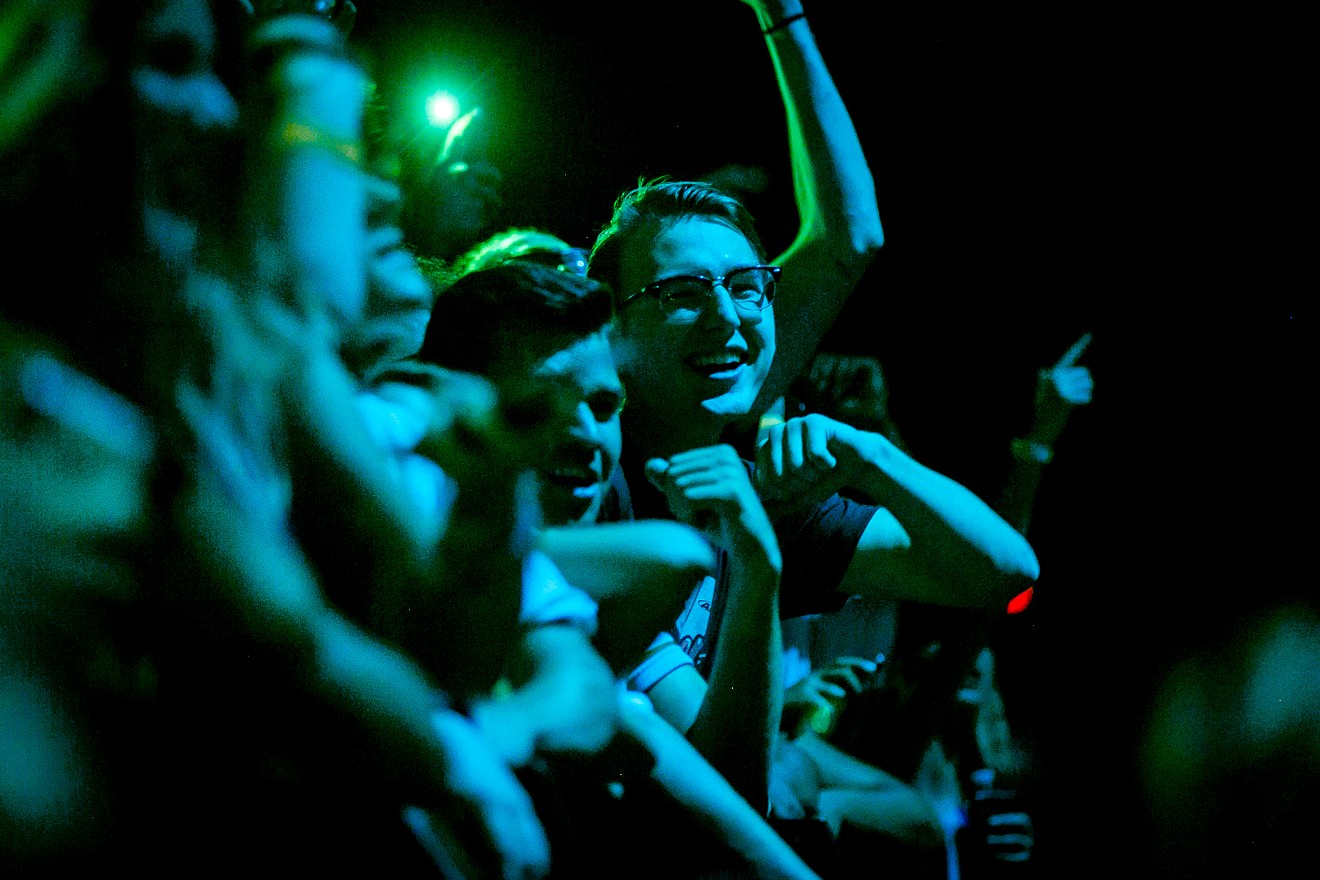Local concert promoter Danny Zelisko is blunt when describing the current situation with live music in the Valley.
“It’s fucked," he says. "Yeah, everything is really fucked right now."
It’s a statement echoed by many in Phoenix’s music scene since the coronavirus (COVID-19) pandemic put life on near-total lockdown. Concerts have been sacrificed for the greater good as the public has gone into quarantine mode to help lessen the spread of the virus.
The shutdown of the Valley’s concert scene happened quickly, and the impact was immediate. In less than a week, local promoters went from ramping up for one of the busiest and profitable periods of the year to facing down a financial nightmare of empty calendars and venues.
All venues (and most nightclubs and bars) are closed until further notice.
Hundreds of concerts over the next six weeks have been postponed, rescheduled, or canceled.
Musicians, DJs, promoters, and venue owners have been hustling to re-book shows, make ends meet, and determine their next moves.
“It's been absolutely devastating,” says Stephen Chilton, who owns Psyko Steve Presents and local venue The Rebel Lounge. “And this is just the beginning.”
Everyone is hoping for the best, but nothing’s certain. Phoenix’s music scene isn’t alone in its struggles. The worldwide concert industry has been grappling with similar issues and could lose an estimated $5 billion in revenue, according to Forbes.
“It’s unparalleled. Nothing like this has ever happened before, not even after 9/11,” Zelisko says. “It’s affected every part of the industry. Nobody’s been spared. The thing that gets me is how quickly this all played out. Everything’s happened so fast.”
The coronavirus has made headlines since the beginning of 2020 as it swept through China, Japan, and other East Asian countries throughout January. It began having a major impact on the concert industry in late February after Green Day and BTS canceled shows in Asia. By then, the virus was spreading throughout the U.S.
In early March, bad news began trickling in. First, Ultra Music Festival in Miami and South by Southwest in Austin were both canceled over coronavirus concerns. Days later, Pearl Jam postponed their spring tour and Rage Against the Machine, Thom Yorke, and other high-profile artists followed suit. Springtime music festivals Coachella and Stagecoach rescheduled for October while industry heavyweights Live Nation Entertainment and AEG Presents suspended all of their North American tours.
Then, the floodgates opened. By March 13, the Centers for Disease Control and Prevention strongly advised against public gatherings of 250 people or more. Dozens of touring artists and bands started canceling or postponing shows en masse, including many scheduled for the Valley. Local promoters like Chilton began scrambling.
“It’s just been a madhouse dealing with everything,” Chilton says. “We're at over 40 [touring] shows that have been changed. We've got to figure out exactly what to do with each. It's not as easy as just saying, ‘Oh, this is canceled.’ Are these shows going away? Are they postponing? Do they have a new date? It's been a lot of communication. A lot of work.”
Local festivals also took a hit. April’s Phoenix Lights electronic dance music festival was the first to fall after its promoter, Relentless Beats, moved the event to early October. Thomas Turner, the company’s owner, says that he had no other choice.
“It was just fucking nuts literally watching everything just completely unravel before my eyes in only a couple days,” Turner says. “I felt an overwhelming sense of irresponsibility running a festival with everything that’s going on, even if the earnings my company would see are six figures or more.”
Venues started going dark. Downtown Phoenix’s Crescent Ballroom and Valley Bar, both managed by local promoter Stateside Presents, ceased concerts and music events on March 14, as did DIY spot The Trunk Space.
Despite all the cancellations and closures, local shows were still happening. Some tried to adapt, but others were defiant, like Bryan Huber of Ghettorude Productions. He told Phoenix New Times he planned to go forward with a show scheduled for March 21 featuring ska legends The Untouchables “because people still need to hear music.” (The gig was later postponed until June.)
On March 15, Arizona Governor Doug Ducey urged events with more than 50 people to cancel. Within hours, Rebel Lounge and other venues decided to close. At Shady Park in Tempe, employees pulled the plug on the weekly EDM event TreeHouse Sundays between DJ sets. Two days later, several popular DJ/dance spots in Scottsdale owned by Evening Entertainment Group — including Bottled Blonde, Hi Fi, Casa Amigos, Pretty Please Lounge, and The Mint — shut down.
As it stands, a majority of the local music scene is now in limbo and waiting things out. Numerous concerts and festivals have been moved to the fall, adding to an already packed schedule. In the meantime, everyone’s trying to be optimistic. Chilton says it's all they can do.
“I’m doing what everyone else is doing: hunkering down and hoping for the best. It'll be the longest that I've gone without putting on a show in a very, very long time,” Chilton says. “It's probably been a decade since I've gone two weeks without a show.”
Larger concert halls like the Live Nation-owned Arizona Federal Theatre and The Van Buren will be able to shoulder the expense of going dark for several weeks. For smaller, independently owned venues like The Rebel Lounge or downtown’s Last Exit Live, though, it might be a life-or-death situation.
“Are we going to be able to weather this storm? I hope so, but it's going to be very, very hard,” Chilton says. “Most of our expense is associated with events. So if there's no events, there's not a lot of expense. But there’s also no money coming in. This is going to be bad for everyone.”
The lack of revenue is hitting many involved in the concert industry, from crew and bartenders to the musicians themselves. Drummer Evan Knisely of local rock act Wyves says they’re already feeling the pinch.
“This month is shaping up to be awfully scary on everyone's wallets. Most of our band make ends meet by gigging, and everything is getting cleared,” Knisely says. “This is the month to build up a nest egg for droughts throughout the rest of the year, and it is getting tanked.”
Chilton says no one in the concert industry could’ve prepared for this scenario, including buying insurance. (According to a recent Rolling Stone article, a majority of policies covering artists and promoters didn’t cover pandemics like the coronavirus.)
“I was just talking to one national broker who said he doesn't have a single client that's got insurance against pandemic. No one's insured for this. No one,” Chilton says. “Basically, any policy that would cover this stopped getting sold last year. In December, when [the coronavirus] first started spreading, companies put a moratorium on any sort of pandemic insurance. No one has anything in place for this.”
Chilton thinks one positive thing could come out of the current crisis: new music from bands with plenty of downtime.
“Hopefully some good records get made right now, right?” Chilton says. “It’s the perfect time to go into the studio or fucking start writing a bunch.”
[
{
"name": "Air - MediumRectangle - Inline Content - Mobile Display Size",
"component": "18478561",
"insertPoint": "2",
"requiredCountToDisplay": "2"
},{
"name": "Editor Picks",
"component": "16759093",
"insertPoint": "4",
"requiredCountToDisplay": "1"
},{
"name": "Inline Links",
"component": "17980324",
"insertPoint": "8th",
"startingPoint": 8,
"requiredCountToDisplay": "7",
"maxInsertions": 25
},{
"name": "Air - MediumRectangle - Combo - Inline Content",
"component": "16759092",
"insertPoint": "8th",
"startingPoint": 8,
"requiredCountToDisplay": "7",
"maxInsertions": 25
},{
"name": "Inline Links",
"component": "17980324",
"insertPoint": "8th",
"startingPoint": 12,
"requiredCountToDisplay": "11",
"maxInsertions": 24
},{
"name": "Air - Leaderboard Tower - Combo - Inline Content",
"component": "16759094",
"insertPoint": "8th",
"startingPoint": 12,
"requiredCountToDisplay": "11",
"maxInsertions": 24
}
]
















